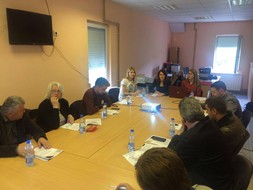Active projects
Active researches
Active evaluations
Agriculture development in Kosovo and environmental impact
Release date: 22.05.2017.
 At the round table organised in Zubin Potok on May 19, 2017, InTER presented the key findings of the brief analysis “Agriculture development in Kosovo and environmental impact”.
At the round table organised in Zubin Potok on May 19, 2017, InTER presented the key findings of the brief analysis “Agriculture development in Kosovo and environmental impact”. Even though investments in agriculture in Kosovo have increased lately, the progress is still slow. In 2015, the Government of Kosovo invested EUR 43 million in agriculture and the support provided by international donors that year was EUR 11 million. Underdevelopment of agriculture and lower environmental impact in relation to the region open the opportunity for improvement of organic production, which is one of the main conclusions of the organized discussion.
According to InTER, some of the reasons for slow development of agriculture include the lack of law enforcement, insufficient number and low level of skills of employees. Environment is not fully included in the agriculture development policy even though it is one of its biggest polluters, according to the analysis. These problems are especially significant in North Kosovo, say the author of the study, Marija Milenković.
“What we recommend is to strengthen organizational and institutional capacities for implementation of agriculture and rural development public policy, which also involves better efficiency of inspections. It is necessary to strengthen the mechanisms for development of organic agriculture in Kosovo and work on introducing certification bodies and promoting standards in this field“, concludes Marija Milenković.
Round table participants agree that farmers from North Kosovo face numerous problems, from administrative issues to those related to the production process and sales of goods in the market.
“The lack of strategies both on local and central level, low awareness and lack of knowledge among agricultural producers, as well as administrative problems we face with every step are some of the key problems“, says Aleksandar Jovanović – Project Manager in the office of the Regional Development Agency in Leposavic.
“There are no regulations, there are double standards, double institutions. Agricultural producers are, as usual, on their own, and do the best they can“, says Rade Utvić – director of the Agricultural Cooperative in Zubin Potok.
Round tble participants included officers for agriculture from the Municipality of Zubin Potok, representatives of agricultural cooperatives, Regional Development Agency Leposavic, representatives of NGOs active in this field, farmers. InTER conducted the research on agriculture within the project “Policy Dialogue for Environmental Protection and Development Action” financed by the European Union Office in Kosovo.
More information about the results of the research and recommendations for improvement of public policy at:
Serbian
English
Albanian
Publications
Resource center
- 08.07.2016.InTER Newsletter 16 Eng
- 20.05.2016.InTER Newsletter 16










